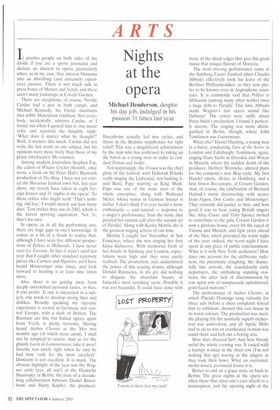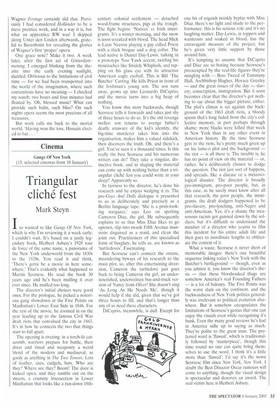Nights at the opera
Michael Henderson, despite his day job, indulged in his passion 31 times last year It puzzles people on both sides of the divide if you are a sports journalist and declare an interest in opera, particularly when, as in my case, that interest blossoms into an absorbing (and extremely expensive) passion. There is not much talk in press boxes of Mozart and Verdi, and there aren't many jockstraps in Covent Garden.
There are exceptions, of course. Neville Cardus had a pen in both camps, and Michael Kennedy, his friend, maintains that noble Mancunian tradition. Not everybody, incidentally, admires Cardus, as I found out when I quoted him to one music critic and received the haughty reply: 'What does it matter what he thought?' Well, it matters this much. Cardus did not write the last word on any subject, but his opinions were more lively than those of my prissy interlocutor. He counted.
Among modern journalists Stephen Fay, the editor of Wisden Cricket Monthly, once wrote a book on Sir Peter Hall's Bayreuth production of The Ring. I have not yet visited the Bavarian festival town but, last year alone, my travels have taken in eight foreign houses and 31 'nights at the opera'. To those critics who might scoff 'That's nothing, old boy', I would merely ask how many days' Test cricket they saw in 2002, which is the fairest sporting equivalent. Not 31, that's for sure.
In opera, as in all the performing arts, there are huge gaps in one's knowledge. It comes as a bit of a shock to realise that, although I have seen five different productions of Pelleas et Melisande, I have never seen La Traviata. In fact it wasn't until last year that I caught other standard repertory pieces like Carmen and Regoletto, yet I have heard Meistersinger nine times, and look forward to hearing it at least nine times more.
Also, there is no getting away from deeply entrenched personal tastes, or bias, if you prefer. If one is interested in a subject, one tends to develop strong likes and dislikes. Broadly speaking my operatic experience is rooted in Germany and central Europe, with a dash of Britten. The Russians are fine but Italian opera, apart from Verdi, is pretty tiresome. Having heard Andrea Chenier at the Met two months ago (of which more anon), I shall not be tempted to return. And as for the ghastly Lucia di Lammermoor, take it away! Goethe was surely right when he said he had time only for the most excellent'. Donizetti is not excellent. It is muck. The obvious highlight of the year was the Wagner cycle (yes, all ten!) at the Deutsche Staatsoper in Berlin, the fruit of a decadelong collaboration between Daniel Barenboim and Harry Kupfer, the producer. Barenboim actually led two cycles, and threw in the Brahms symphonies for light relief! This was a magnificent achievement by the man who has confessed to taking up the baton as a young man in order to conduct Tristan und IsoIde.
Not surprisingly, the Tristan was the chief glory of the festival, with Deborah Polaski really singing the Liebestod, not barking it, and Rene Pape starring as King Mark. Pape was one of the main stars of the whole enterprise, along with Waltraud Meier, whose status in German houses is stellar. I don't think I've ever heard a more enthusiastic — and natural — response to a singer's performance than the noise that greeted her curtain call after the second act of Parsifal. Along with Karita Mattila she is the greatest singing actress of our time.
Mattila I caught last November in San Francisco, where she was singing her first Katya Kabanova. With memories fresh of her Jenufa in Salzburg and London, expectations were high and they were partly realised. The production, alas, undermined the power of this searing drama, although Donald Runnicles, in the pit, did nothing to disguise the abundant beauty of Janacek's most ravishing score. Possibly it was too beautiful. It could have done with more of the sharp edges that give this great music that unique flavour of Moravia.
The most moving performance came at the Salzburg Easter Festival when Claudio Abbado effectively took his leave of the Berliner Philharmoniker, as they now prefer to be known even in Anglophone countries. It is commonly said that Pelleas et Melisande (among many other works) owes a huge debt to Parsifal. This time Abbado made Wagner's last opera sound like Debussy! The critics were sniffy about Peter Stein's production. I found it perfectly decent. The singing was more distinguished in Berlin, though, where John Tomlinson was Gurnemanz.
What else? Daniel Harding, a young man in a hurry, conducting Turn of the Screw in London and Edinburgh; Tomlinson, again, singing Hans Sachs in Dresden and Wotan in Munich, where the sudden death of the producer, Herbert Wernicke, altered plans for the company's new Ring cycle. My first Handel opera, Alcina, in Hamburg, and a first Simon Boccanegra, at Covent Garden, And, of course, the celebration of Bernard Haitink's music directorship, with scenes from Figaro, Don Carlos and Meistersinger. They certainly did justice to him, and how good it was to hear young British singers like Alice Coote and Toby Spence invited to contribute to the gala. Covent Garden is now a glorious house, every bit the equal of Vienna and Munich, and light years ahead of the Met, which provided the worst night of the year; indeed, the worst night I have spent in any place of public entertainment. What is it with New York audiences? How does one account for the deliberate rudeness, the pneumatic coughing, the shamefully late arrivals, the scandalously early departures, the unthinking standing ovations, the utter lack of discrimination by row upon row of sumptuously upholstered, grim-faced matrons?
The performance of Andrea Chenier, at which Placido Domingo sang valiantly for three acts before a chest complaint forced him to withdraw, showed this vast house in its worst colours. The production was inert, the playing (by the normally superb orchestra) was uninvolved, and all Aprile Millo had to do to win an overheated ovation was stand there and belt out a boring aria.
How they cheered her! And how bloody awful the whole evening was. It ended with a frumpy woman in the third row (I'm not making this up) waving at the singers as they took their bows. What an overrated, snotty-nosed, provincial house it is.
Better to end on a grace note, so back to Berlin. The great nights at the opera are often those that open one's ears afresh to a masterpiece, and the opening night of the Wagner Festtage certainly did that. Previously I had considered Hollander to be a mere prentice work, and in a way it is, but what an apprentice RW was! I skipped along tinter den Linden afterwards, grateful to Barenboim for revealing the glories of Wagner's first 'proper' opera.
One grace note? Make it two. A week later, after the first act of Gatterdiimmentng. I emerged blinking from the theatre into the early evening sunlight, dazzled. Oblivious to the limitations of civil time — for we had been transported into the world of the imagination, where such conventions have no meaning — I checked my watch: two hours and four minutes had floated by. Oh, blessed music! What can provide such balm, such bliss? On such nights opera seems the most precious of all treasures.
But work calls me back to the mortal world. `Having won the toss, Hussain elect ed to bat . '



















































 Previous page
Previous page